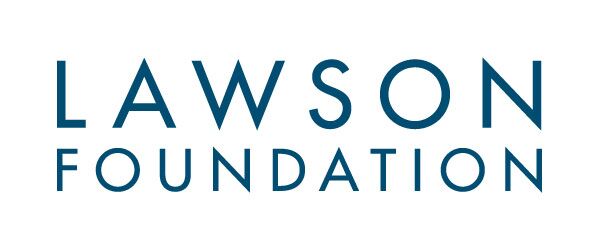We work to connect children and youth with nature through policy, research, and practice.
We aim to have a deep impact on families and communities across the country. This is woven into all our key initiatives including: Forest School Canada, the major educational arm of CNAC; Thrive Outside, our online resource and learning hub; and our research and policy development efforts.
Our Staff
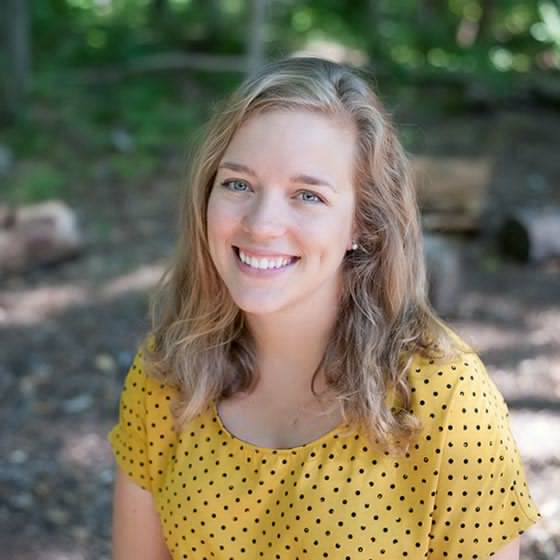 Stephanie (she, her) is a Settler woman of European descent who has had the privilege of being born and raised on the unceded and unsurrendered territory of the Anishinaabe Algonquin Nation. She has a deep and loving appreciation for the Land and all that it provides. Having been born into a large extended family, she finds joy and comfort in being surrounded by her family, friends, and colleagues and she considers these relationships her most valuable asset. In her spare time you can find her puttering in the kitchen and garden, chasing after her toddler, and hosting the Ottawa Pizza Podcast.
Stephanie (she, her) is a Settler woman of European descent who has had the privilege of being born and raised on the unceded and unsurrendered territory of the Anishinaabe Algonquin Nation. She has a deep and loving appreciation for the Land and all that it provides. Having been born into a large extended family, she finds joy and comfort in being surrounded by her family, friends, and colleagues and she considers these relationships her most valuable asset. In her spare time you can find her puttering in the kitchen and garden, chasing after her toddler, and hosting the Ottawa Pizza Podcast.She comes to the organization with over 15 years of experience of working with children in the public and nonprofit sectors. She joined the CNAC team in 2016 as the Administrative Coordinator, and in more recent years her work has focused on business development, fundraising, and operations. Currently at CNAC, she is working to grow the organization's social enterprise model and create new opportunities for growth and collaboration. At the moment, she is committed to addressing Calls to Action #57, 62, 63, and 92 (i,ii,iii) by ensuring that CNAC’s business practices align with our values as an organization.
Day to day, this looks like:
- Prioritizing working with Indigenous consultants and Indigenous-led organizations whenever possible
Actively fundraising for CNAC’s Aurora Heat bursary fund, and CNAC’s decolonization efforts
- Building and maintaining relationships with Indigenous partners and genuinely consulting with them
- Prioritizing hiring Indigenous team members and ensuring there is a path for growth within the organization
- Ensuring that CNAC is resourced to provide training for all staff on the history of Indigenous people on Turtle Island, the history and legacy of residential schools, intercultural competency, and anti-racism.
 Lukeisha acknowledges all of Turtle Island as Indigenous. As a person of African descent Lukeisha (She/Her) recognises the ongoing impacts of colonialism. In 2014 Lukeisha came to the unceded, unsurrendered traditional territory of the Algonquin Anishinaabe. This Land serves as a teacher, friend, container, and provider for her and her child. She will continue to learn the truth of this Land and its people, and she will purposefully nurture and honor her connection to this Land through outdoor play and learning. To the Indigenous people of this Land, the water protectors, the trees - our standing friends, the Elders and Knowledge Holders she has learned from in sharing circles, she is forever grateful and honoured for this time to listen and cherishes all that she has learned.
Lukeisha acknowledges all of Turtle Island as Indigenous. As a person of African descent Lukeisha (She/Her) recognises the ongoing impacts of colonialism. In 2014 Lukeisha came to the unceded, unsurrendered traditional territory of the Algonquin Anishinaabe. This Land serves as a teacher, friend, container, and provider for her and her child. She will continue to learn the truth of this Land and its people, and she will purposefully nurture and honor her connection to this Land through outdoor play and learning. To the Indigenous people of this Land, the water protectors, the trees - our standing friends, the Elders and Knowledge Holders she has learned from in sharing circles, she is forever grateful and honoured for this time to listen and cherishes all that she has learned.Lukeisha is a cisgender Black woman of the Kalinago heritage, raised along the beautiful shores of Hairouna, “Land of the Blessed”, now known as St. Vincent and the Grenadines. This is where she spent most of her time playing outdoors; dancing in the rain on black sand beaches; hiking the volcano; and swimming in beaches surrounded by volcanic rocks. She has fond memories from playing in nearby streams and banana fields; and enjoying fresh produce from mountain trips with her grandma, all the while connecting and making relationships with the Land she knows and loves deeply.
For a short time Lukeisha connected with the Land of the Maroons (Jamaica) where she studied Library and Information Studies at the University of the Westies Mona Chapter.
Lukeisha is life long learner-unlearner, a peaceful disrupter, and is passionate about creating brave spaces for all children to be fully immersed in nature and on the Land. Like Richard Louv stated, ‘Every child needs nature not just the ones with parents who appreciate nature. Not only those of a certain economic class or culture or set of abilities. Every child.’
When not on the Land with children of Black in Nature Ottawa as a forest school practitioner, Lukeisha serves as a facilitator with Child and Nature Alliance Canada where she is committed to Calls to Action Nos. 10, 13, 15, 63, 64, 79 and 93. Lukeisha will collaborate with CNAC and local Indigenous Elder or Knowledge Sharers to help co-create courses to reflect a more inclusive story of the First Peoples of this Land, Treaties, and culture. Lukeisha strives to dismantle systematic racism, white supremacy culture, and break down barriers that impact children’s access to outdoor play. She is currently focused on Call to Action # 93, ensuring newcomers or anyone else who participates in these courses will learn about the truth of the Land.
 “I kindly acknowledge our earth and all her gifts. I give thanks to the land, water and sky for the opportunity to thrive. I am grateful for the winged ones, the four legg-ed, the water beings and plants which nourish and support me with opportunities to learn and grow. I know that this land, water and sky are a part of me. I am grateful for their support.”
“I kindly acknowledge our earth and all her gifts. I give thanks to the land, water and sky for the opportunity to thrive. I am grateful for the winged ones, the four legg-ed, the water beings and plants which nourish and support me with opportunities to learn and grow. I know that this land, water and sky are a part of me. I am grateful for their support.”I am passionate about reconnecting people to nature in an authentic way. My work centers health and wellbeing by aiming to foster meaningful, personalized connections with Land. I am honored to be based on the unceded territory of the Mi'kmaq and Beotuk in Corner Brook, Newfoundland. I am a Plains Cree person and an active band member of Kahkewistahaw First Nation in Saskatchewan - Treaty 4 Territory. My ancestral roots also sink deep into Newfoundland’s settler and mixed race culture. I grew up in Calgary, Alberta and the interior of BC - I have a deep connection to many Lands across the country.
In my role as Manager of National Programs, I am personally committed to Call to Action number 14. I am committed to making more space for Indigenous Languages in our offerings across Canada. I am constantly learning and listening to understand how to do this work in a better way.
I would like to honour my family, ancestors and mentors, as they have been an integral part of the foundations of my work. Thank you to my mother, for providing me with a wide range of experiences to learn from. Thank you to my father, for sharing his passion for fishing and for supporting green things to grow. Thank you to my sister, for always playing and laughing beside me. Thank you to my great-grandmother, for our forest and gardening adventures together. Thank you to grandfather, for your humility, honesty and straightforward approach to life and problem solving. Thank you to my mentors, teachers and coaches who have helped me to explore and navigate my own path. Thank you to my aunties, uncles, other grandparents and cousins and friends, who have supported me and laughed alongside me. The work that I do is a result of the combined support of all who stood beside and came before me. I thank those people wholeheartedly.
I am a registered Early Childhood Educator IV and studied Psychology during my time at Grenfell Campus - Memorial University. For 5 years, I watered Sapling Forest School to grow and provide over 200 local people per year of all ages with an opportunity to deepen their relationship with land. I am also a Certified Forest and Nature School Practitioner, Yoga Teacher CYT500 and a Certified Forest Therapy Guide. I intertwine my experiences to provide a mindful, supportive approach to my work as Manager of National Programs and direct support for the Facilitation Team at the Child and Nature Alliance.
In my spare time, I love to walk with my partner, our Husky and our Chessie Retriever, in the quiet forests of Newfoundland in all weather and seasons. I forage food seasonally and I am an advocate for supporting local small businesses.
 Being born and raised in a small northern community on the traditional territory of Cree, Moose Cree in Treaty 9 territory instilled in me a deep connection and respect to the Land and all that it provides us with. I find peace in outdoor activities such as canoeing, fishing, hiking, camping, cross country skiing, foraging wild edibles and practicing tree identification.
Being born and raised in a small northern community on the traditional territory of Cree, Moose Cree in Treaty 9 territory instilled in me a deep connection and respect to the Land and all that it provides us with. I find peace in outdoor activities such as canoeing, fishing, hiking, camping, cross country skiing, foraging wild edibles and practicing tree identification.I come to CNAC with experience from various settings such as a conservation authority, non-profit organizations and school boards where I worked directly with persons with disabilities and at-risk youth. Giving back to the community is a very important aspect in my life. I have had the opportunity to volunteer at a community kitchen, a food bank, Big Brothers Big Sisters and Red Cross. As a musician, our band has volunteered entertainment at local events for Pride Month, International Women’s Day and food bank fundraisers.
I am on a continuous journey of furthering my understanding of colonial history and contemporary legacy and how it impacts Indigenous communities. In an administrative role at CNAC, I am committed to Calls to Actions 10 i & ii, 19, and 57. These commitments are demonstrated in the following ways:
10 i & ii - I will provide Indigenous practitioners with the application to the Aurora Heat Bursary Program, enabling financial assistance for course fees and enhancing the accessibility of the course.
19 - I commit to making a monthly donation to Water First, an organization that works to address the water crisis in Indigenous communities.
57 - I educate myself on the history of Indigenous peoples by setting aside 30 minutes every Friday morning to complete professional development and skills-based training on related topics. I am currently completing the 4 Seasons of Indigenous Learning training.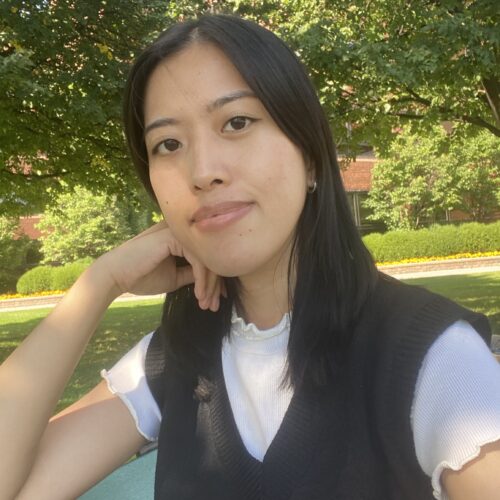 I come from the sunny Philippines, where my childhood was spent eating the juiciest mangoes, getting sunburnt from staying too long at the beach, and running and play-fighting with my playmates, among many other things. The Land has taught me so much and given me more than I could ever ask for. The Land I grew up in bears traces of different colonial powers that once tried to take it over. It is a Land that had to reimagine itself independently and continues to do so.
I come from the sunny Philippines, where my childhood was spent eating the juiciest mangoes, getting sunburnt from staying too long at the beach, and running and play-fighting with my playmates, among many other things. The Land has taught me so much and given me more than I could ever ask for. The Land I grew up in bears traces of different colonial powers that once tried to take it over. It is a Land that had to reimagine itself independently and continues to do so.Having moved to so-called Canada to study, I am currently based on the unceded and unsurrendered territory of the Algonquin Nations. I continue to educate myself on the colonial past of Turtle Island and the ways in which it parallels the Land I grew up in. Recognizing that the Indigenous Peoples in so-called Canada and the millions displaced from their lands share struggles, we must unite and remain steadfast in our efforts to protect and liberate our Lands.
My work at CNAC is a way to exercise my creativity and connect people to our courses and programs, helping to realize our vision of connecting children with nature.
I commit to the following calls to action: #84, #85, #86, #93, #94.
Our Facilitators
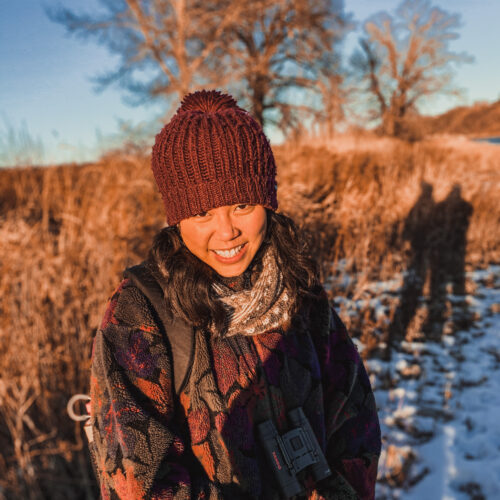 Anne Azucena is a social justice facilitator focused on PilipinX liberation, a weaving artist and healer. She is based in the territory of Treaty 7, the Blackfoot Confederacy Moh’kíns’tsis. Her unique experience as a second generation Pilipinx-Canadian has made her passionate about being intentional in acting as a bridge in cultivating community healing in the diaspora and the land. Their journey towards re-claiming and re-membering ancestral ways of healing are rooted in understanding the PilipinX community as Uninvited Visitors on Turtle Island. Azucena continues to find ways in which community can work towards our relation to the land and how we can heal the community and land together.
Anne Azucena is a social justice facilitator focused on PilipinX liberation, a weaving artist and healer. She is based in the territory of Treaty 7, the Blackfoot Confederacy Moh’kíns’tsis. Her unique experience as a second generation Pilipinx-Canadian has made her passionate about being intentional in acting as a bridge in cultivating community healing in the diaspora and the land. Their journey towards re-claiming and re-membering ancestral ways of healing are rooted in understanding the PilipinX community as Uninvited Visitors on Turtle Island. Azucena continues to find ways in which community can work towards our relation to the land and how we can heal the community and land together.The Calls to Action Anne is personally committed to are #62 and # 63 under the Education and Reconciliation section, and #92 in Business and Reconciliation.
 My name is Vashti. I am a mother of three nature loving kids. I love learning, moving and creating. I have a soft spot for crafts that involve wool, cotton or any natural fibre. I did my undergraduate degree at McMaster University and completed my teaching degree at OISE with qualifications for intermediate/senior level, teachables in Science and Math.
My name is Vashti. I am a mother of three nature loving kids. I love learning, moving and creating. I have a soft spot for crafts that involve wool, cotton or any natural fibre. I did my undergraduate degree at McMaster University and completed my teaching degree at OISE with qualifications for intermediate/senior level, teachables in Science and Math.My desire to have my kids connect with the natural world has led me down a path where I have had the privilege to connect, grow and love in nature.
I have been a support facilitator with Child in Nature Alliance since 2023. I am a certified Forest and Nature school practitioner and facilitate in Kitchener with Nature connect.
I am personally committed to call to action 63iii Building student capacity for intercultural understanding, empathy, and mutual respect. With my work in forest school, as a mother and as a lifelong learner this call to action is one that I can work on daily in a tangible way.
I look forward to meeting new people, learning from others and sharing the gifts I have to give.
 My name is Lise Brown (she/her) and I am situated in Treaty One Territory - Winnipeg, Manitoba
My name is Lise Brown (she/her) and I am situated in Treaty One Territory - Winnipeg, Manitoba
Winnipeg derives from the Ininew word win-nipi meaning murky water.I have been a facilitator with the Child & Nature Alliance of Canada since 2018 and I love teaching the Forest and Nature School Practitioners Course. In 2020, my colleague Adrian Alphonso and I had the opportunity to decolonize the Forest and Nature School Practitioners Course curriculum, which is now guided by the 7 Relationships of an Ethical Forest and Nature School in Kanata.
I am the co-founder of a small business called Momenta (est. 2006). If you’re interested you can check out our website at experiencemomenta.com or our Instagram page @experiencemomenta – we deliver Forest and Nature School programs, Outdoor Education programs, Adventure Therapy, Certifications in Wilderness First Aid and consulting on these areas of expertise.
I am a Forest and Nature School Practitioner and a registered social worker - my work entails reducing barriers for folks to participate in outdoor adventures and to connect (or reconnect) individuals and groups to the land in hopes that a connection to land helps to feed their physical, emotional, intellectual and spiritual health.
 Tricia grew up in the forests and gardens of North Vancouver, where she remembers playing in the blossoms of the cherry tree in her garden and tucking herself under the fern fronds in her school grounds. She has had the privilege to live in the Lynn Creek watershed for her entire life. Her ancestors come from the UK, France, and Germany, and she is a settler on Tsleil-Waututh, Squamish, and Musqueam lands.
Tricia grew up in the forests and gardens of North Vancouver, where she remembers playing in the blossoms of the cherry tree in her garden and tucking herself under the fern fronds in her school grounds. She has had the privilege to live in the Lynn Creek watershed for her entire life. Her ancestors come from the UK, France, and Germany, and she is a settler on Tsleil-Waututh, Squamish, and Musqueam lands.Tricia's educational background is in geography, literature, permaculture, and ecological restoration. While she came to nature-based learning from an ecological perspective, wanting to encourage children to connect more deeply to the land, she has become more and more inspired by the ways in which land-based and emergent learning practices honour every child. She loves the way that forest school brings together children and adults in an interconnected and compassionate community.
Tricia has been playing and learning with children outdoors since 1995 at the Lynn Canyon Ecology Centre. She co-founded the Fresh Air Learning forest school in 2010, and she is currently the program director. She enjoys the rich dialogue, play, and reflection that emerge from participants in the Forest School Practitioner's Course and looks forward to the learning opportunities that each course brings for participants and facilitators alike.
 My name is Hannah Gehrels (they/them) and I am a third-generation settler coming from the rocky shores of Lake Superior in Anishinabek territory—including the Ojibwa of the Fort William First Nation—in Thunder Bay. I now make my home in Mi’kmaq Territory and the beautiful Island of Epekwitk/PEI.
My name is Hannah Gehrels (they/them) and I am a third-generation settler coming from the rocky shores of Lake Superior in Anishinabek territory—including the Ojibwa of the Fort William First Nation—in Thunder Bay. I now make my home in Mi’kmaq Territory and the beautiful Island of Epekwitk/PEI.I still remember the moment I realized that I could spend my working life being outside, and haven’t looked back. From tree planting jobs to spending time researching and learning more about frogs, songbirds, salmon, native pollinators, and most recently crabs. I started the PEI Wild Child Forest School as a way to combine my love of land, my joy of being around kids, and the passion I feel about giving children and youth (and adults!) opportunities to connect with nature as a way to help us understand our place on this earth.
I love getting to facilitate Forest and Nature Practioner’s Courses because I get to meet so many like-minded folks who are interested in getting more kids outside. And it inspires me to be a part of a community of people committed to this vision. It is an honour to be able to share the knowledge and skills I have gained in running forest school programs for over 8 years, and I am continuously grateful to learn from everyone else in the circle with all of the knowledge, skills, teachings, stories, songs, and ways of being that they have to teach and share with me. I am committed to Calls to Action #62, 63, and 92 in the ways these show up in my work and personal life.
When I am not facilitating courses or working, I enjoy foraging, LARPing (live action role playing), being in the sauna, jumping into the ocean, and hanging out with my niblings.
 A little bit about me; I am a settler on Treaty 4 Territory, home to the Nekaneet Cree Nation, Wood Mountain Lakota people and the homeland of the Metis. This land had been shared as summer hunting grounds for as long as the sun has shone and as long as the river has flowed. My family and I live beside what was once known as the Whitemud River along the border of the Grasslands National Park. I am a mother to two wild prairie kids. I am also a teacher. For 14 years I have taught early elementary in a multi-graded setting. It was this work that led me to CNAC and to the Forest and Nature School Practitioner Program. Recently, I have taken on a new role at the secondary level and am excited to see how FNS can be integrated at a new level.
A little bit about me; I am a settler on Treaty 4 Territory, home to the Nekaneet Cree Nation, Wood Mountain Lakota people and the homeland of the Metis. This land had been shared as summer hunting grounds for as long as the sun has shone and as long as the river has flowed. My family and I live beside what was once known as the Whitemud River along the border of the Grasslands National Park. I am a mother to two wild prairie kids. I am also a teacher. For 14 years I have taught early elementary in a multi-graded setting. It was this work that led me to CNAC and to the Forest and Nature School Practitioner Program. Recently, I have taken on a new role at the secondary level and am excited to see how FNS can be integrated at a new level.My family and I are honoured to be caretakers of this land, as we live, ranch, teach and grow for the next generations.
CALL TO ACTION #63: We call upon the Council of Ministers of Education, Canada to maintain an annual commitment to Aboriginal education issues, including: Specifically, Building student capacity for intercultural understanding, empathy, and mutual respect.
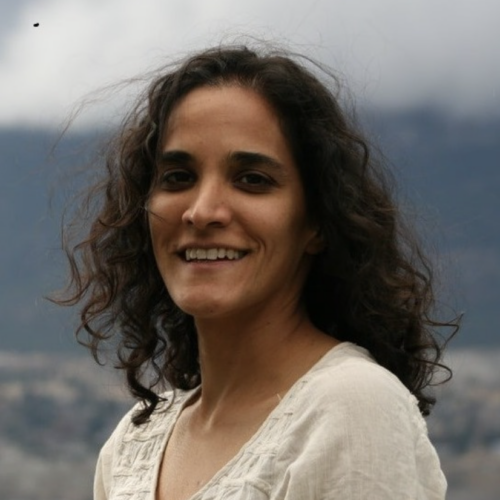 My name is Anita and I live, work and play in the traditional territory of the Blackfoot Confederacy. My parents immigrated to Canada from India in the 1970’s and settled in the Lower Mainland, where I grew up.
My name is Anita and I live, work and play in the traditional territory of the Blackfoot Confederacy. My parents immigrated to Canada from India in the 1970’s and settled in the Lower Mainland, where I grew up.My Forest and Nature school journey started when I moved to Okanagan BC, and started to work with children in various settings, including afterschool programs and daycares. I definitely saw the results when they had regular exposure to nature – happier and healthier children. This led me to learn more about the Child and Nature Alliance, and eventually become a facilitator.
As I was growing up, the forest was my sanctuary and my playground. What I love most about my relationship to land is the feelings of peace and connectedness that it brings me. I love climbing trees, exploring under rocks, learning about plants, and taking in all the sights, sounds and smells that nature has to offer.
The Calls to Action that I am personally committed to lie in the realm of education. Specifically No 63. and No 64, as they focus on building intercultural understanding, empathy, and mutual respect.
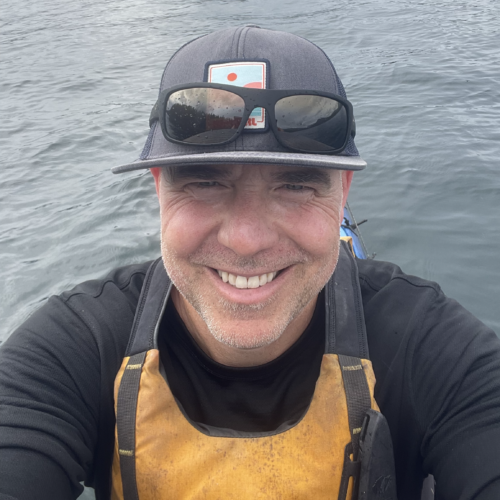 Chris was born on the traditional and treaty territory of the Michi Saagiig and Chippewa Anishinaabeg and the signatories of the Williams Treaties. His familial lineage is Hungarian, and Irish. He was raised on the unceded, unsurrendered Territory of the Anishinaabe Algonquin Nation, and for the last 25 years he's had the pleasure and privilege of living in and on the traditional unceded territories of the lək̓ʷəŋən peoples represented by the Songhees and Esquimalt Nations and the W̱SÁNEĆ peoples represented by the Tsartlip, Pauquachin, Tsawout, Tseycum and Malahat Nations.
Chris was born on the traditional and treaty territory of the Michi Saagiig and Chippewa Anishinaabeg and the signatories of the Williams Treaties. His familial lineage is Hungarian, and Irish. He was raised on the unceded, unsurrendered Territory of the Anishinaabe Algonquin Nation, and for the last 25 years he's had the pleasure and privilege of living in and on the traditional unceded territories of the lək̓ʷəŋən peoples represented by the Songhees and Esquimalt Nations and the W̱SÁNEĆ peoples represented by the Tsartlip, Pauquachin, Tsawout, Tseycum and Malahat Nations.His journey in this work began many moons ago. He's had the privilege to work alongside the innovators, educators and collaborators at CNAC since 2012. Over that time he's held many different roles each rewarding and informative in its own way. Despite all the hats he's been able to wear, his favourite role remains that of facilitator and mentor of learning experiences.
Chris' commitment to the TRC's Calls to Action is woven throughout his work with CNAC, and is particularly focussed on Education for Reconciliation, #62-65.
Chris has worked and studied in the field of nature based education since…well… as long as he can remember. He earned his BPHE and MEd in Adult Education and Environmental Studies from the University of Toronto, and his PhD in Educational Studies from the University of Victoria. He has worked in adventure education, started nature based preschools, developed programming with his local school districts, and is currently the Manager of Child Care Services at Camosun College in Victoria BC.
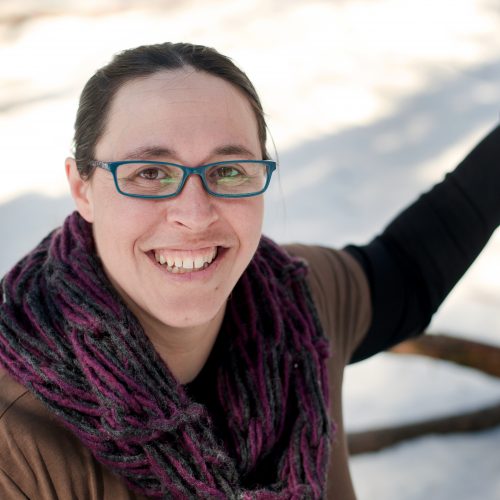 Julie found her love for the natural world when, as a child, she moved from wandering the open fields and forests of Northern Ontario to the big city of Ottawa. To fill the void this change had left, she joined the scout movement and has since been involved as a leader. Through different experiences with the scouts, Julie has come to discover the magic that comes with connecting children with nature. After finishing her B.Ed, Julie went on to l’Université Laval to study the development of children’s environmental sensitivity influenced by their time spent in nature. She has since worked as a teacher in Nunavik and Ontario, gardening with kids and working to create a sense wonder for the natural world. In 2016, Julie has set up a Forest School program for all students attending École élémentaire et secondaire publique Rivière Rideau. She is now coordinating this program, all the while mentoring other teachers in the school to integrate Forest school principles in their all around teaching practice. Julie is also passionate about developing forest school resources in French and hopes to, one day offer workshops for french speaking educators.
Julie found her love for the natural world when, as a child, she moved from wandering the open fields and forests of Northern Ontario to the big city of Ottawa. To fill the void this change had left, she joined the scout movement and has since been involved as a leader. Through different experiences with the scouts, Julie has come to discover the magic that comes with connecting children with nature. After finishing her B.Ed, Julie went on to l’Université Laval to study the development of children’s environmental sensitivity influenced by their time spent in nature. She has since worked as a teacher in Nunavik and Ontario, gardening with kids and working to create a sense wonder for the natural world. In 2016, Julie has set up a Forest School program for all students attending École élémentaire et secondaire publique Rivière Rideau. She is now coordinating this program, all the while mentoring other teachers in the school to integrate Forest school principles in their all around teaching practice. Julie is also passionate about developing forest school resources in French and hopes to, one day offer workshops for french speaking educators. Monika’s experience with land and land-based education is unconventional, which also describes much of her life. With Russian and Nigerian origins, formative years in Montreal where she also learnt French, adulthood (mostly) in Toronto, and having travelled to many parts of the world, Monika identifies as a multilingual global citizen, without an attachment to a particular land. She also grew up in very urban environments and can count on 1 hand the number of camping/canoe/cottage trips she has taken. All the while, Monika has always enjoyed being outdoors, on and with land in its varying natural forms. When the COVID pandemic hit, Monika, a mother of 3 young kids, started turning to the land regularly, with her children, as a mental health strategy. This led to an emergence of something deep within her, that she hadn’t realized was present, that included a sense of peace and relationship with land and a strong desire to share that with others. So, as a Black woman, as someone whose work and life has been strongly tied to equity, inclusion, and social justice, and as an experienced facilitator, she jumped at the opportunity to join CNAC as a way to claim her rightful space in the world of ‘outdoor education.’ Monika also has a BA (Hons.) in Kinesiology and Health Science and her MPH in Health Promotion and Community Development. She is curious and multi-passionate, and this work is among other work that she does to facilitate connection, community-building, and conversations, in the name of individual and social transformation.
Monika’s experience with land and land-based education is unconventional, which also describes much of her life. With Russian and Nigerian origins, formative years in Montreal where she also learnt French, adulthood (mostly) in Toronto, and having travelled to many parts of the world, Monika identifies as a multilingual global citizen, without an attachment to a particular land. She also grew up in very urban environments and can count on 1 hand the number of camping/canoe/cottage trips she has taken. All the while, Monika has always enjoyed being outdoors, on and with land in its varying natural forms. When the COVID pandemic hit, Monika, a mother of 3 young kids, started turning to the land regularly, with her children, as a mental health strategy. This led to an emergence of something deep within her, that she hadn’t realized was present, that included a sense of peace and relationship with land and a strong desire to share that with others. So, as a Black woman, as someone whose work and life has been strongly tied to equity, inclusion, and social justice, and as an experienced facilitator, she jumped at the opportunity to join CNAC as a way to claim her rightful space in the world of ‘outdoor education.’ Monika also has a BA (Hons.) in Kinesiology and Health Science and her MPH in Health Promotion and Community Development. She is curious and multi-passionate, and this work is among other work that she does to facilitate connection, community-building, and conversations, in the name of individual and social transformation. Emily gratefully acknowledges that she lives, works, and raises her family on the traditional territory of the Kwanlin Dün First Nation and Ta’an Kwäch’än Council in the Yukon, where she has been living for the past decade. She also honours the traditional land of the Hul’qumi’num'-speaking people of sc̓əwaθenaɁɬ təməxʷ (Tsawwassen) First Nation, where she grew up at the mouth of the Fraser River. Her ancestral roots are Nordic and from the Celtic-Anglo Isles.
Emily gratefully acknowledges that she lives, works, and raises her family on the traditional territory of the Kwanlin Dün First Nation and Ta’an Kwäch’än Council in the Yukon, where she has been living for the past decade. She also honours the traditional land of the Hul’qumi’num'-speaking people of sc̓əwaθenaɁɬ təməxʷ (Tsawwassen) First Nation, where she grew up at the mouth of the Fraser River. Her ancestral roots are Nordic and from the Celtic-Anglo Isles.With over 10 years of experience as a certified teacher, Emily has worked with young people in various roles, including youth leadership trip facilitator, outtrip director, motivational speaker, native plant researcher, curriculum designer, and classroom teacher. She holds a BEd in Indigenous Perspectives from Simon Fraser University and a BA in Biogeography from the University of British Columbia.
Emily co-founded Rivers to Ridges to foster curiosity and connection to the natural world from a young age. The organization offers acclaimed outdoor programs and consulting services to educational institutions and clients nationwide. Rivers to Ridges is dedicated to weaving Indigenous perspectives into its work and actively supports the Calls to Action from the Truth and Reconciliation Commission, with a strong emphasis on education and land stewardship.
Emily is part of the 2SLGBTQI+ community, and she brings this inclusivity into her work and personal life. As a mother, she enjoys sharing her passion for the natural world with her child. Her interests include basket-weaving, gathering wild herbs, fermenting foods, and exploring creative arts like beading, swing dancing, playing music, and gardening.
 My name is Stéfanie Matko. I was born and grew up in Kapuskasing, Ontario, traditional territory of the Cree and Moose Cree people since time immemorial and on whose land I am grateful to have spent my childhood.This territory is where my love of nature took root; my most treasured childhood memories are of those long stretches of time when my siblings and friends and I were left to our own devices outdoors. Enseignante maintenant à la retraite, mon rôle auprès des
My name is Stéfanie Matko. I was born and grew up in Kapuskasing, Ontario, traditional territory of the Cree and Moose Cree people since time immemorial and on whose land I am grateful to have spent my childhood.This territory is where my love of nature took root; my most treasured childhood memories are of those long stretches of time when my siblings and friends and I were left to our own devices outdoors. Enseignante maintenant à la retraite, mon rôle auprès des
enfants a toujours été guidé par l’idée que l’enfant est maître de ses propres apprentissages et que son cheminement optimal se réalise par le biais du jeu et de l’exploration autodirigés. I have always believed that nature is the ideal setting to promote self-realization, well-being and true learning, both for kids and adults. And never is this more evident than when we are set free outside to explore, discover and play. I am very proud to be part of the CNAC team
where this philosophy is at the heart of every decision and grateful for the opportunity to work alongside other adults who wish to incorporate more nature into the daily lives of the children they work with.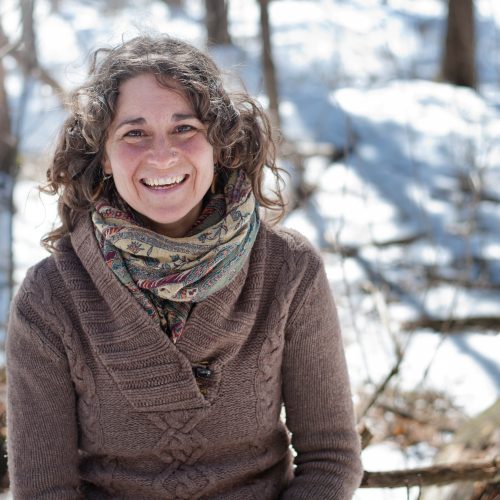 Growing up camping, paddling and playing in the woods, lakes and rivers of Eastern Ontario, Carly is often found outside wandering the landscape being curious with whoever she is with - her own two boys or a group of eager children or adults. Carly believes our human resilience is strengthened from meeting our edges through contact with ourselves and being willing to lean in a little bit more. The wildness is the perfect place to meet edges, to discover who we are and our place in the fabric of life.
Growing up camping, paddling and playing in the woods, lakes and rivers of Eastern Ontario, Carly is often found outside wandering the landscape being curious with whoever she is with - her own two boys or a group of eager children or adults. Carly believes our human resilience is strengthened from meeting our edges through contact with ourselves and being willing to lean in a little bit more. The wildness is the perfect place to meet edges, to discover who we are and our place in the fabric of life.Nature’s influence lead Carly to pursue degrees in GeoScience, Outdoor Recreation, Parks and Tourism and a Bachelor of Education. She has travelled many hills and valleys around the world, lead wilderness trips, created her own forest and nature school program in the Madawaska Valley, and supported schools in Renfrew County to encourage nature based play and learning in their school yards and surrounding wild spaces. Carly is currently working as a supply teacher with the Renfrew County School Board as well as facilitating CNAC Practitioner Courses, where she seeks to incorporate her skills as a nature mentor inspiring others to deepen their own connection.
 Cynthia Lapierre yiatsih. Franco-Ontarienne chia' Wendat endi'. Yänionnyen' iwayitiohkou'tenh.
Cynthia Lapierre yiatsih. Franco-Ontarienne chia' Wendat endi'. Yänionnyen' iwayitiohkou'tenh.
My name is Cynthia Lapierre. I am Franco-Ontarienne and Wendat. I am Bear Clan.I have called many Lands home. I was born and raised on the traditional lands of the Atikameksheng Anishnawbek, also known as the area near the City of Greater Sudbury in Northern Ontario. I have lived on foreign lands, specifically Spain, South Korea, and Taiwan. I lived on Tiohtià:ke (Montréal island) while working in Kahnawà:ke. Finally, I have returned to and settled on the Land that all my ancestors (French, Scottish, and Wendat) who have lived on Turtle Island called home before me, Nionwentsïo. I work in language and culture revitalization in Wendake, where I am also a registered member of the Huron-Wendat Nation. I walk in both worlds. I work as an ally to decolonize the worldview and eurocentric culture I grew up in. I also work as a reconnecting Indigenous person who has found my way back to community, to language, to culture, and to ceremony.
Since I was a kid, being outside has been my happy place. Laying down on the ground is how I ground myself. Being outside is my medicine. As someone who suffers from performative perfectionism, being outside reminds me that everything gets done in its own time, in its own beautiful way, all while being influenced by its environment. I want to give children what I wish I had been given: a place to live, learn, and play free of schedules, bells, and grading systems that did not represent nor accurately capture my learning journey. I am especially interested in and currently exploring Land-based learning for language and culture with Indigenous peoples.
Here are the Truth and Reconciliation Commissions's calls to action that I focus on as an ally and Indigenous activist:
13. We call upon the federal government to acknowledge that Aboriginal rights include Aboriginal language rights.
14. We call upon the federal government to enact an Aboriginal Languages Act (in summary, to provide funding for the preservation, revitalization, and strengthening of Aboriginal languages and cultures).
43. We call upon federal, provincial, territorial, and municipal governments to fully adopt and implement the United Nations Declaration on the Rights of Indigenous Peoples as the framework for reconciliation.
44. We call upon the Government of Canada to develop a national action plan, strategies, and other concrete measures to achieve the goals of the United Nations Declaration on the Rights of Indigenous Peoples.``They tried to bury us. They didn't know we were seeds.`` (quote inspired by a couplet written by the Greek poet Konstantinos Dimitriadis).
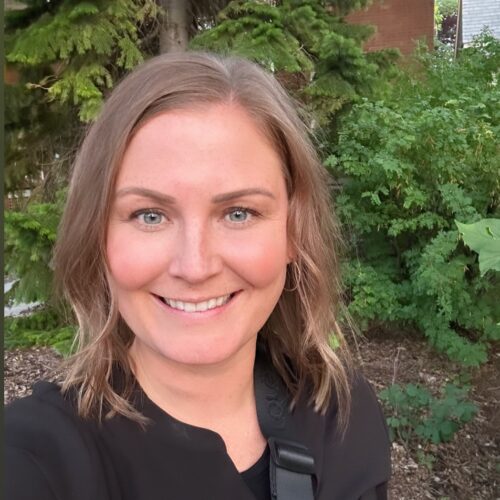 I live, learn and play on Treaty 6 Territory, home to the Cree and the homeland of the Metis. I reside with my partner Doug and our child Boston. I have been an educator in the public school system in a variety of roles for the last 14 years. I believe that traditional school models do not suit all learners and students of all ages need to spend time engaging on the land. I am fortunate to work in a kindergarten to grade twelve school where I have the opportunity to learn outdoors with a variety of age groups. Being part of Child and Nature Alliance as a Facilitator has continued to help me grow both personally and professionally.
I live, learn and play on Treaty 6 Territory, home to the Cree and the homeland of the Metis. I reside with my partner Doug and our child Boston. I have been an educator in the public school system in a variety of roles for the last 14 years. I believe that traditional school models do not suit all learners and students of all ages need to spend time engaging on the land. I am fortunate to work in a kindergarten to grade twelve school where I have the opportunity to learn outdoors with a variety of age groups. Being part of Child and Nature Alliance as a Facilitator has continued to help me grow both personally and professionally.63. We call upon the Council of Ministers of Education, Canada to maintain an annual commitment to Aboriginal education issues, including: i. Developing and implementing Kindergarten to Grade Twelve curriculum and learning resources on Aboriginal peoples in Canadian history, and the history and legacy of residential schools. ii. Sharing information and best practices on teaching curriculum related to residential schools and Aboriginal history. iii. Building student capacity for intercultural understanding, empathy, and mutual respect. iv. Identifying teacher-training needs relating to the above.
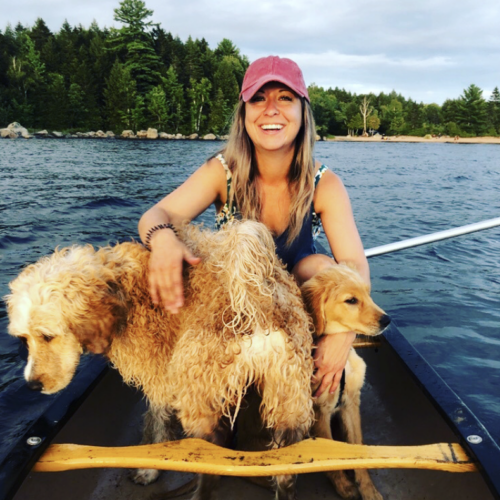
 Noureen was born and raised in Pakistan. She has been privileged to serve academic and not-for-profit institutions in Pakistan, the United Arab Emirates and Canada. As a facilitator, researcher and community leader, Noureen is continuing to avail volunteering and professional opportunities to serve people of diverse age groups and cultures. She aspires to capitalize on her professional qualification (M.Ed.) and personal experiences of regaining her well-being through nature while helping others re-establish harmony with the Earth. Noureen strongly believes that her deep reflection and strong observation skills have enabled her life-long and self-directed learner. Skills learned while spending childhood in nature. She trusts that by utilizing these skills one can connect to the inner self, an entire universe of its own, and knowing oneself can help find the purpose as humans. Noureen hopes to help human beings regain their connection to nature and their inner self. Noureen is proud to be a member of the CNAC family and is excited to make the best out of this opportunity.
Noureen was born and raised in Pakistan. She has been privileged to serve academic and not-for-profit institutions in Pakistan, the United Arab Emirates and Canada. As a facilitator, researcher and community leader, Noureen is continuing to avail volunteering and professional opportunities to serve people of diverse age groups and cultures. She aspires to capitalize on her professional qualification (M.Ed.) and personal experiences of regaining her well-being through nature while helping others re-establish harmony with the Earth. Noureen strongly believes that her deep reflection and strong observation skills have enabled her life-long and self-directed learner. Skills learned while spending childhood in nature. She trusts that by utilizing these skills one can connect to the inner self, an entire universe of its own, and knowing oneself can help find the purpose as humans. Noureen hopes to help human beings regain their connection to nature and their inner self. Noureen is proud to be a member of the CNAC family and is excited to make the best out of this opportunity. Parisa is an Iranian-Canadian living, working, and playing on the traditional territories of the Blackfoot Confederacy (Siksika, Kainai, Piikani), the Tsuut’ina, the Îyâxe Nakoda Nations, the Métis Nation (Region 3), and all people who make their homes in the Treaty 7 region of Southern Alberta. Her journey as an educator started with teaching English and Swedish to people of all ages in Iran. Since then, she has found meaning in community and connecting people to the natural world, as she believes it is crucial for our wellbeing and the wellbeing of our beautiful planet Earth.
Parisa is an Iranian-Canadian living, working, and playing on the traditional territories of the Blackfoot Confederacy (Siksika, Kainai, Piikani), the Tsuut’ina, the Îyâxe Nakoda Nations, the Métis Nation (Region 3), and all people who make their homes in the Treaty 7 region of Southern Alberta. Her journey as an educator started with teaching English and Swedish to people of all ages in Iran. Since then, she has found meaning in community and connecting people to the natural world, as she believes it is crucial for our wellbeing and the wellbeing of our beautiful planet Earth.Her passion for the environment started in the woods in Sweden, where she grew up. Later in life, it led her to pursue a Bachelor's degree in Environmental Science, followed by a Master's degree doing research on modelling long-term ice sheet changes to understand the stability of Greenland Ice Sheet in a warmer world from the University of Calgary.
In her free time, she takes joy in doing yoga, skiing, swimming, and many other activities outdoors. She also paints, reads, and enjoys writing poetry.
 Juwain grew up in a rural setting with the freedom and encouragement to play and explore outdoors. Juwain developed a deep connection to the land at an early age and has made a career out of connecting adults and children to nature. After obtaining a degree in International Development and Environmental Science from Trent University, Juwain began her journey in West Africa connecting communities to the land through education. Juwain then obtained her Bachelor of Education from Queen’s University. Juwain continued to help people nurture their relationship to the land, as a naturalist with the Ministry of Natural Resources, as a classroom teacher, and an outdoor education instructor.
Juwain grew up in a rural setting with the freedom and encouragement to play and explore outdoors. Juwain developed a deep connection to the land at an early age and has made a career out of connecting adults and children to nature. After obtaining a degree in International Development and Environmental Science from Trent University, Juwain began her journey in West Africa connecting communities to the land through education. Juwain then obtained her Bachelor of Education from Queen’s University. Juwain continued to help people nurture their relationship to the land, as a naturalist with the Ministry of Natural Resources, as a classroom teacher, and an outdoor education instructor.Juwain is currently the Program Site Administrator for the Ottawa Carleton District School Board Outdoor Education Centres. Juwain oversees the development of inquiry-based, curriculum-linked, outdoor education programming for teachers and students in Ottawa area schools. Juwain supports the outdoor education centre staff, classroom teachers, and students daily, so they are comfortable using the outdoors as their classroom. When not in the forest at the outdoor education centres, Juwain can be found cycling, skiing, and gardening on her hobby farm east of Ottawa.
 Jamie is a settler Canadian who arrived in this country with his family at the age of two, after being born in Bavaria, Germany. He now lives and explores with his family on Treaty 1 territory, in Winnipeg, Manitoba. His ties to both Germany and the Interlake region of Manitoba have instilled in him a fondness for all that is possible in the hinterlands.
Jamie is a settler Canadian who arrived in this country with his family at the age of two, after being born in Bavaria, Germany. He now lives and explores with his family on Treaty 1 territory, in Winnipeg, Manitoba. His ties to both Germany and the Interlake region of Manitoba have instilled in him a fondness for all that is possible in the hinterlands.The main focus of Jamie's work is connecting people with nature, with themselves and with each other, through nature. He is dedicated to helping develop creative opportunities for child led outdoor education and relationship building across cultures, hoping to contribute to the process of truth and reconciliation as people learn together on the Land.
He is excited to be part of this journey with the Child and Nature Alliance of Canada, as part of the facilitation team for practitioners course offerings in Manitoba!
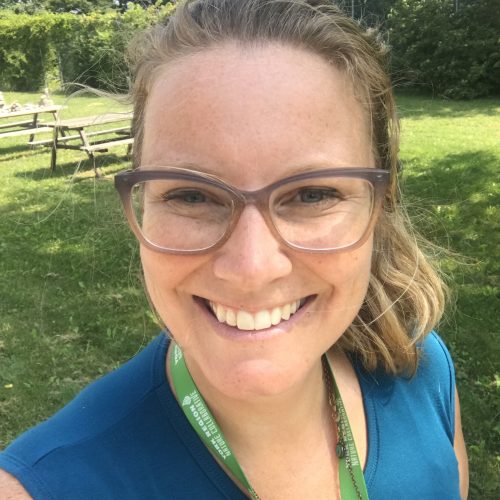 Tanya grew up in both urban and rural spaces climbing trees, mucking about in Ontario ravines and exploring on wilderness trips with her older brother. A dog (and now 2 nature-loving children) often by her side, she seeks out adventure and connection with the land and has always let her heart lead the way. With a background in Kinesiology and Outdoor Education from McMaster University, Tanya has worked in the outdoors as a wilderness guide, adventure education facilitator, and spent 5 years at an independent school servicing vulnerable Toronto youth. A BEd from the University of Toronto took her on a new path to ensure nature connection was accessible to all, especially in the public-school system. Tanya has been working with an Ontario school board for over 13 years and loves to learn alongside others in, around and for the environment in both conventional and alternative settings. She has taught in all divisions including a term at one of the board’s Outdoor Education Centre where she led a Ministry Pilot focused on Environmental Inquiry. Drawn to inquiry, placed-based education, and the pedagogy of Forest School, Tanya champions collaborative, transformative, responsive environments that support student voice and belonging. Over the past five years, Tanya has focused on these passions to meet educators where they are in order to shift mindsets and inspire learning - outside. Tanya recently shifted to system leadership role and supports Environmental Literacy and Outdoor Learning K-12.
Tanya grew up in both urban and rural spaces climbing trees, mucking about in Ontario ravines and exploring on wilderness trips with her older brother. A dog (and now 2 nature-loving children) often by her side, she seeks out adventure and connection with the land and has always let her heart lead the way. With a background in Kinesiology and Outdoor Education from McMaster University, Tanya has worked in the outdoors as a wilderness guide, adventure education facilitator, and spent 5 years at an independent school servicing vulnerable Toronto youth. A BEd from the University of Toronto took her on a new path to ensure nature connection was accessible to all, especially in the public-school system. Tanya has been working with an Ontario school board for over 13 years and loves to learn alongside others in, around and for the environment in both conventional and alternative settings. She has taught in all divisions including a term at one of the board’s Outdoor Education Centre where she led a Ministry Pilot focused on Environmental Inquiry. Drawn to inquiry, placed-based education, and the pedagogy of Forest School, Tanya champions collaborative, transformative, responsive environments that support student voice and belonging. Over the past five years, Tanya has focused on these passions to meet educators where they are in order to shift mindsets and inspire learning - outside. Tanya recently shifted to system leadership role and supports Environmental Literacy and Outdoor Learning K-12. Rebecca’s love of the land started on a sprawling home farm with woods and water in Elora, Ontario. Passionate about passing on that love to others, Rebecca’s work with children and families is ultimately about connection - connecting to ourselves, to each other, and to the earth. Living in places like India, Indonesia, Benin, France, and Costa Rica has deepened her appreciation for the diverse natural world and for the immensity of all that we can learn from each other. Rebecca came to forest school through an interest in outdoor experiential education, and from teaching Kindergarten at a Waldorf-inspired primary school. She feels honoured now to run Kitchener Forest School, and partners with the City of Kitchener to dream up programs and facilitate learning with children ages 3-12, and with Kindergarten classes in local school boards. Each season brings new surprises, new wonders, new questions. Alongside the children and leaders in her groups, Rebecca digs into the ecological landscape through exploration, imaginative story, open-ended play, boisterous games, and quiet moments by the pond.
Rebecca’s love of the land started on a sprawling home farm with woods and water in Elora, Ontario. Passionate about passing on that love to others, Rebecca’s work with children and families is ultimately about connection - connecting to ourselves, to each other, and to the earth. Living in places like India, Indonesia, Benin, France, and Costa Rica has deepened her appreciation for the diverse natural world and for the immensity of all that we can learn from each other. Rebecca came to forest school through an interest in outdoor experiential education, and from teaching Kindergarten at a Waldorf-inspired primary school. She feels honoured now to run Kitchener Forest School, and partners with the City of Kitchener to dream up programs and facilitate learning with children ages 3-12, and with Kindergarten classes in local school boards. Each season brings new surprises, new wonders, new questions. Alongside the children and leaders in her groups, Rebecca digs into the ecological landscape through exploration, imaginative story, open-ended play, boisterous games, and quiet moments by the pond. Tiiu is first generation Canadian, of British and Estonian descent. She is a mother and lives with her family in Southern Ontario, in the land of the Anishinaabe, Haudenosaunee and Huron-Wendat, in the land of the First Peoples of the Williams Treaty.
Tiiu is first generation Canadian, of British and Estonian descent. She is a mother and lives with her family in Southern Ontario, in the land of the Anishinaabe, Haudenosaunee and Huron-Wendat, in the land of the First Peoples of the Williams Treaty.Tiiu is an educator and an artist. She currently works in the elementary public school system, and is committed to engaging students with the natural world on a daily basis. She also has over two decades experience writing and performing songs. She continues to create and share songs that support children and communities connecting to the land. You can find this work at www.landheartsong.com.
Tiiu is committed to developing knowledge and understanding of the culture and history of the Indigenous Peoples of this land, and of marginalized peoples she shares this land with. She believes all humans should have access and opportunity to develop a meaningful relationship with the land, and is committed to learning and advocating to make that change happen in her community and work.
 I come from Peru, where I studied Geography and Environment. Eventually, my journey led me to Turtle Island, where I pursued a Master’s degree in Environment and Sustainability. Over the years, I have contributed my skills to various settings—non-profit organizations, conservation authorities, schools, and even the private sector. Each experience has shaped my perspective and enriched my journey.
I come from Peru, where I studied Geography and Environment. Eventually, my journey led me to Turtle Island, where I pursued a Master’s degree in Environment and Sustainability. Over the years, I have contributed my skills to various settings—non-profit organizations, conservation authorities, schools, and even the private sector. Each experience has shaped my perspective and enriched my journey.As a child, I spent countless hours immersed in the vibrant jungles of Peru while visiting my grandparents. Those memories ignited a lifelong commitment to caring for the environment. Inspired by these experiences, I chose to pursue a career in environmental education. As an educator, I thrive on continuous learning and community building. Whether through books, engaging conversations, or hands-on experiences, I am devoted to fostering a profound connection to the Land. It is my way of honoring those childhood moments—the rustling leaves, the earthy scents, and the sense of wonder—that shaped my path.
When I am not immersed in my work, you will find me hiking through new parks, exploring forests, and connecting with the great outdoors. Nature fuels my adventurous spirit.
I actively engage in learning about Indigenous Peoples and Truth and Reconciliation. My commitment to Call to Action 57 reflects my dedication to fostering understanding and respect for the Land and Indigenous Knowledge.
Our Partners
Our Funders






